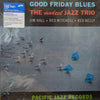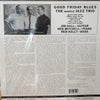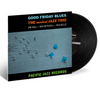





The Modest Jazz Trio - Good Friday Blues
Guitar - Jim Hall [click here to see more products featuring Jim Hall]
Piano - Red Mitchell
Bass - Red Kelly
Written by Red Mitchell (A1, B2), Ann Ronell (A2), Johnny Mercer, Victor Schertzinger (A3), Jim Hall (B1), George & Ira Gershwin (B3)
1 LP, Deluxe Tip-On Jacket
Original analog Master tape : YES
Heavy Press : 180g
Record color : black
Speed : 33RPM
Size : 12”
Stereo
Studio
Record Press : RTI
Label : Blue Note Tone Poet
Original Label : Pacific Jazz
Recorded in 1960 at Van Gelder Studio, Englewood Cliffs, New Jersey
Recorded by Rudy Van Gelder
Original session produced by Richard Bock
Reissue produced by Joe Harley
Mastered by Kevin Gray at Cohearent Audio
Originally released in May 1960
Reissued in 2024
Tracks :
Side A
- Melody For Melonae
- I'll Keep Loving You
Side B
- Rene
- Omega
Reviews :
“Jackie McLean had always been a highly emotional soloist, so it makes sense that he was one of the first hard bop veterans to find a new voice in the burning intensity of jazz's emerging avant-garde. McLean had previously experimented with Coltrane's angular modes and scales and Ornette's concept of chordal freedom, but Let Freedom Ring was the landmark masterpiece where he put everything together and ushered in the era of the modernists at Blue Note. A number of saxophonists were beginning to explore the ability of the instrument to mimic human cries of passion, and here McLean perfected a long, piercing squeal capable of expressing joy, anguish, fury, and more. The music on Let Freedom Ring remained more rooted in hard bop structure than Coleman's, and McLean was still recognizably himself, but that was precisely what was revolutionary about the album: It validated the avant-garde aesthetic, demonstrating that it had enough value to convert members of the old guard, and wasn't just the province of radical outcasts. There are only four pieces, one of which is the surging Bud Powell ballad "I'll Keep Loving You"; the other three are McLean originals ("Melody for Melonae," "Rene," and "Omega," dedicated to his daughter, son, and mother respectively) that spotlight his tremendous inventiveness on extended material and amaze with a smoldering fire that never lets up. Pianist Walter Davis takes the occasional solo, but the record is McLean's statement of purpose, and he accordingly dominates the proceedings, with the busy, free-flowing dialogues of bassist Herbie Lewis and Ornette drummer Billy Higgins pushing him to even greater heights. The success of Let Freedom Ring paved the way for a bumper crop of other modernist innovators to join the Blue Note roster and, artistically, it still stands with One Step Beyond as McLean's greatest work." Allmusic Review by Steve Huey
Rating:
AllMusic : 5 / 5 ; Penguin Guide to Jazz : 4 / 4 ; The Rolling Stone Jazz Record Guide : 5 / 5


